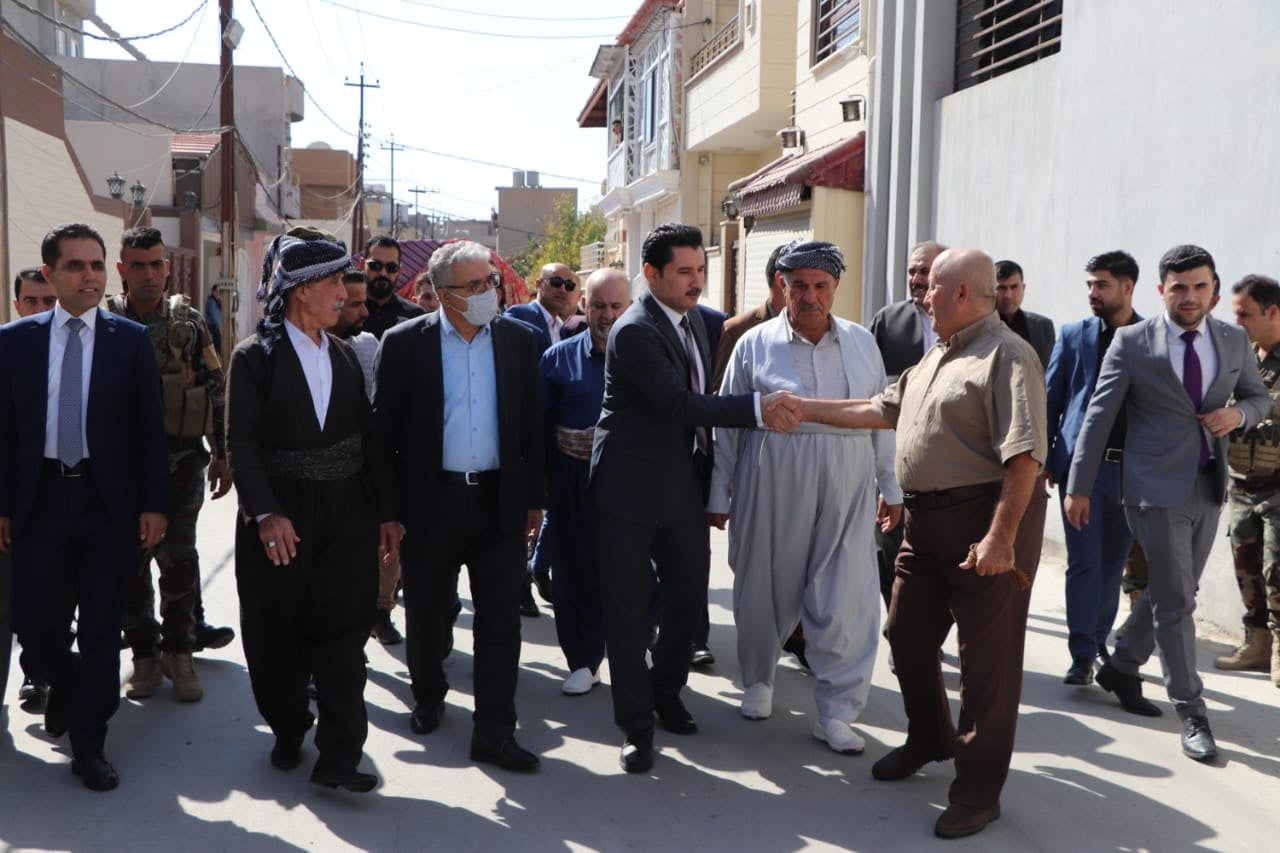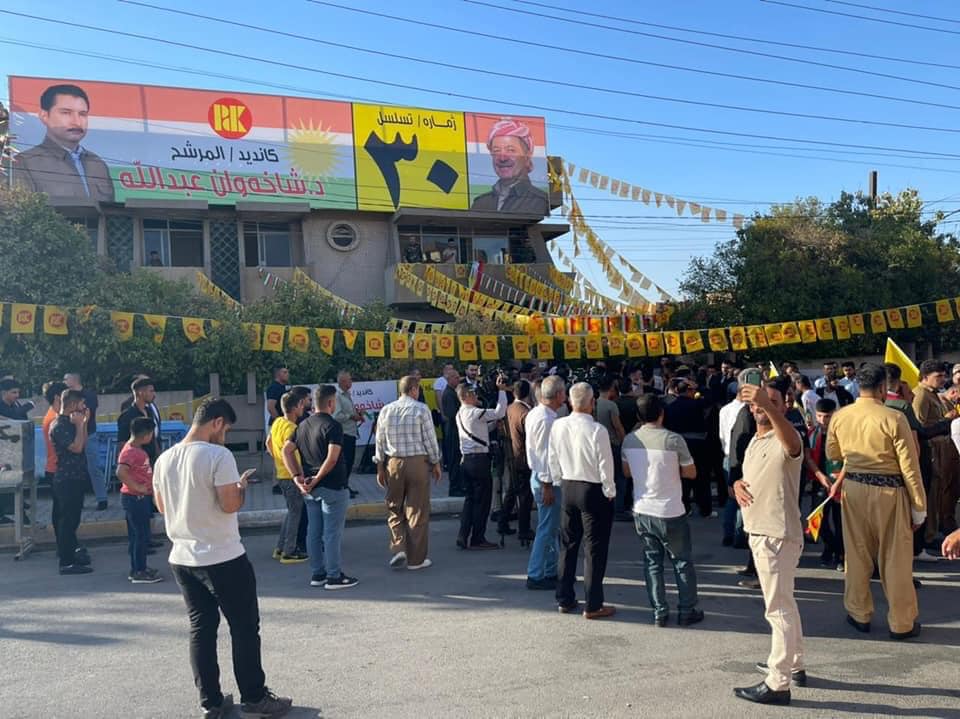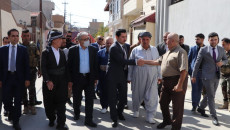The Arab and Turkmen parties in the oil-rich, multi-ethnic city of Kirkuk showed no objection for the return of Kurdistan Democratic Party KDP, one of the leading Kurdish parties, to resume political activities and lead electoral campaign with no military or security personnel or mission.
Early September, a leader of KDP, led by Masoud Barzani and main shareholder of Kurdistan Regional Government KRG, said the KDP will be back to Kirkuk following the boycott since October 2017 events, when Iraqi troops regained control of Kirkuk and the disputed territories, to open its offices and launch electoral campaigns for Iraqi parliament election race due October 10th 2021.
The KDP says it has not regained all its offices in Kirkuk yet and called on Iraqi leaders to stand by their words.
Arab Alliance: No objection
"No one has banned KDP from political struggle in Kirkuk in the past or at the present because it is registered by the Iraqi government per Iraqi law which guarantees such a right," said Hatam al-Ta'i, spokesperson for Arab Alliance, an umbrella for the parties representing the Arab community in Kirkuk.
No one has banned KDP from political struggle in Kirkuk in the past or at the present
"The Arabs are concerned about the return of KDP which has practiced illegal acts in some of its headquarters, particularly the one occupied by Kirkuk's joint operations' command," he added.
"The KDP has played non-political roles and the proof is when counter terrorism service and (Iraqi) security forces (ISF) entered into that office, they found three rotten bodies in the sewage," he elaborated.
"This is a poof that this party was practicing non-political activities and counter human rights' actions denied in Kirkuk."
"Besides, pro-KDP forces were carrying out wide arrest raids of young people in Arab neighborhoods, majority are missing up today, aside from during up and destruction of Arab villages under control of their security and military forces."
The oil rich city of Kirkuk, located 238 kilometers north of Baghdad, is an ethnically mixed province of Kurds, Sunni and Shiite Arabs, and Turkmen. It has long been at the center of disputes between Baghdad and the autonomous Kurdistan Regional Government KRG.
Kurds accuse the Arabs of being supporters of Saddam Hussein regime which massacared the Kurds in the 1970s till the 1990s while Arabs and Turkmen accuse the Kurds, particularly KDP and PUK of reprisal after 2003 by leading arbitrary arrests, detnetions, assassinations and executions up to 2017, the period they were holding the senior admin and security positions of Kirkuk and the disputed territories.
The KDP was a senior role player in Kirkuk following the toppling of Saddam Hussein regime in April 2003 up to October 2017 when the Iraqi government declared victory over the Islamic State ISIS and imposed (Law imposing) process and took over power in the territories disputed between Baghdad and Erbil.

Kirkuk, September 9th 2021- Shakahawan Abdullah, a candidate of Kurdistan Democratic Party KDP is back to Kirkuk since 2017 boycott. Media team of Abdullah
The Arabs are sensitive about the return of KDP which they accuse of being separatists following a referendum for independence of Kurdistan region provinces from Iraq in 2017 led by KDP in Kurdistan region of Iraq KRI and Kirkuk, which generated wide protests all over Iraq.
"Even in their media campaign, they hurt feelings of Arab and Turkmen people by raising party and Kurdistan flag not the Iraqi flag when opened office of a parliament nominee," spokesperson of Arab alliance said.
"This ideology is still the same and this party is extremely ethnic and partisan, trying to eradicate other components."
The Arab alliance has won three seats of the Iraqi parliament elections of 2018 which the KDP boycotted. Iraqi Turkmen Front ITF, the leading Turkmen party, has won three seats of Kirkuk while the patriotic Union of Kurdistan PUK, partner and rival of KDP, has won six seats in 2018 and 2014 as well.
Iraqi Turkmen Front ITF: return with no guns
"The KDP can return to Kirkuk as a political party and join the electoral process as it is officially licensed by the Iraqi government," said Qahtan al-Wandawi.
The KDP can return to Kirkuk as a political party and join the electoral process
"If Peshmerga (Kurdish fighters), Asayish (security) or any forces affiliated to KDP will be allowed to return, then we absolutely reject it. We will never accept the situation to return to its stand before October 2017.
Turkmen, the third largest ethnic group in Iraq after Arabs and Kurds, are spread across the country, residing almost exclusively in the northern towns and villages stretching from Tal Afar through Mosul, Erbil, Altun Kopri, Kirkuk, Tuz Khurmatu, Kifri and Khanaqin. They are all Muslims, half Sunnis and half Shiites.
Turkmen political parties won eight seats out of 329 in Iraq's May 2018 parliamentary elections. ITF holds three seats, and the Turkmen Bloc has five seats.
Back in 2017, the KDP suspended all its political activities in Kirkuk province, deserted its offices and all the local officials affiliated with the party who used to occupy governmental, security and administrative positions were displaced to Erbil.
The KDP then said Kirkuk has been occupied and insisted to normalize the security situation in Kirkuk and evacuate its offices taken by security services and military commands.
On May 8th, Iraqi Prime Minister Mustafa al-Kadhimi said in an interview with Iraqi TV channels the KDP is entitled to get back its offices in Kirkuk but without any weapons. He referred to a joint committee between Baghdad and Erbil for this purpose.
KDP: our people are eager for our return
"The KDP has its own public in Kirkuk hope it returns as they believe in the party and its cause," said Shakahwan Abdullah one of KDP nominees for Iraqi parliament elections in Kirkuk.
The KDP has nominated two nominees for 2 of the three electoral districts of Kirkuk. One million eligible voters of Kirkuk, out of total 1.6 million population, will nominate 12 MPs to Baghdad out of 130 nominees.
"We could have had more nominees but this is our party's strategy," Abdullah added.
Kirkuk, September 12, 2021- Shakhawan Abdullah, KDP nominee, welcomes KDP supporters in Kirkuk.
The new electoral law ratified last November, a key demand of demonstrators in 2019, changes each of the country’s 18 provinces into total 83 electoral districts in order to prevent parties from running on unified lists, which has in the past helped them easily take all the seats in a specific province. Instead, the seats would go to whoever gets the most votes in the electoral districts.
The 329-member house of representatives was elected in May 2018. The vote is held every four years, but the protesters have been demanding early elections.
The KDP has not received back its offices as some of it are still occupied yet
"We will reopen our offices and hope the PM and other commanders will return the KDP offices back," Abdullah said.
"We have agreed to open offices for parliament nominees till we receive back the party office for electoral campaign, meetings and conferences."
Regarding the stand of Arabs and Turkmens, Abdullah said "politicians speak and watch their interests and agendas from one side, either their agenda or imposed on them."
An office of KDP evacuated
Sources in Kirkuk told KirkukNow that three weeks ago an office of KDP downtown of Kirkuk used by Iraqi security forces ISF has been evacuated.
The sources added an agreement was made for 100 members of Erbil local police to guard KDP office and its nominees in the electoral campaign.
On May 23rd, a group of Kurdish Peshmerga officers were back to Kirkuk to represent the Kurdish Regional government KRG in the joint coordination center in K1 military base northwest of the city.
According to the Iraqi constitution, the Federal and the regional government can jointly run the disputed territories.
The disputed territories extend from Khanaqin in the east on the border with Iran to the oil rich city of Kirkuk heading to the west of Mosul in Shingal, home to Ezidi ethno-religious minority, on the border with Syria.
Currently, Iraqi army, local and federal police, Brigade 61 of Special Forces along with Shiite paramilitary of Popular Mobilization Forces PMF, are under Kirkuk joint operations’ command, an umbrella for the security forces running the security of Kirkuk province.







